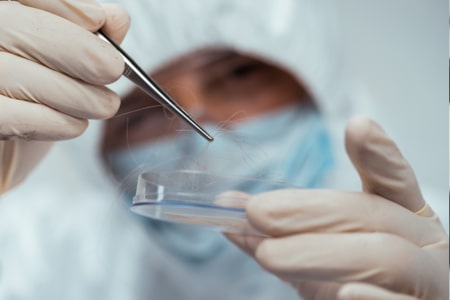July 6, 2021
A Forensic Scientist Talks About the Job

In this Article
Michael Howard
Forensic Scientist (Criminalist), Self-employed
Over 29 years in the field
How did you begin your career?
I got into the forensic field by accident.
I was working in the toxicology lab at the medical school in Portland, and the state police crime lab was upstairs. They’d come down and ask for assistance with blood alcohol or toxicity, so I got to know them.
When they got a grant to expand the lab, I decided I’d just as soon not be a medical tech the rest of my life. After that it was on-the-job training. I went to the FBI academy for training in hairs and fibers, instrumental analysis for paint chips—all that trace evidence.
To you, what is forensic science?
On television shows like CSI they have criminalists interviewing and arresting people. In real life criminalists do not do that. In some states we can only use the evidence that has been collected by police officers, in other states there are teams that process crime scenes. The person who collects the evidence may not be the one who actually analyzes it. Each piece of evidence goes to its own specialty: DNA, firearms, drugs, toxicology, or trace evidence.
What is most satisfying about forensic science?
What I enjoy most about forensic science is the problem solving. You look at the evidence to see what it’s telling you. How can you use the experts, scientific tests, and your own knowledge to answer questions and solve problems?
The forensic field is changing. Laboratories are being accredited and there are different standards. There are written procedures detailing how to do the analysis. You can’t just say, “I know how to use these instruments and I can figure it out.” The changes are driven by arguments that attorneys make. There’s a standardization for everything. They have to know how the procedure is done, what the normal range is. They want to read a result and know it’s the same, no matter which lab did the test.
What’s the most challenging thing about the job?
I’m not the first at the scene, the state folks are. The challenge on my part as a defense criminalist is to go back and look at the photos, look at the write-ups, the lab notes, and decide if they actually collected all the evidence they needed. A lot of what I do deals with the underbelly of society and it’s not necessarily fun to do that. I encounter bad stuff: mutilated bodies, child abuse, autopsies. Sometimes people say, “I can’t do this anymore, I don’t want to see any more dead bodies.”
What skills are most important to hone?
You need to understand scientific principles. You need to know how to conduct an experiment, generate a theory, and then see if you can make it fail. In DNA, you have to know enough biology to understand genetics. In firearms testing, you need know physics, math, how things ricochet, and how trajectories can be figured out.
You’ve got to understand the instrument you’re using, how a mass spectrometer works, what it’s doing, what it’s telling you; how you might get a false positive or false negative reading. You have to take notes, write reports, and be articulate enough to explain complicated science to a jury.
How do you handle the stress?
A lot of it is talking with the people you deal with every day. In forensics we often develop a warped sense of humor; we find humor in grotesque things. Forensic folks together will laugh about stuff that would horrify people outside the field. You build your own defenses, and vent it at work.
